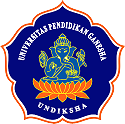Pengembangan Panduan Konseling Rational Emotive Behavior Therapy Untuk Mereduksi Perilaku Ketidakjujuran Akademik pada Siswa
DOI:
https://doi.org/10.23887/jurnal_bk.v7i1.1107Keywords:
rational emotive behavioral therapy, ketidakjujuran akademik, penelitian dan pengembanganAbstract
This development research resulted in a product in the form of a rational emotive behavior therapy counseling guidebook to reduce academic dishonesty behavior in junior high school students. The research procedure used is a 4D development model (Define, Design, Develop and Disseminate). The guidebook assessment consists of 5 BK experts. The results of data analysis in the implementation of the product content validity test with indicators of usability, feasibility, and accuracy obtained the results of CVR = 22 and CVI = 1 (very appropriate). The results of the effectiveness test of the researcher's guidebook involved 16 students using the one group pretest posttest design method. The results of the effectiveness test showed that the development of a rational emotive behavior therapy counseling guidebook was effective in reducing academic dishonesty behavior in junior high school students. The results of the effect size calculation can be concluded that the test has a high effectiveness. Thus, the provision of Rational Emotive Behavior Therapy counseling has a high effectiveness in reducing academic dishonesty behavior in students.
Abstrak
Penelitian pengembangan ini menghasilkan produk berupa buku panduan konseling rational emotive behavior therapy untuk mereduksi perilaku ketidakjujuran akademik pada siswa SMP. Prosedur penelitian yang digunakan adalah model pengembangan 4D (Define, Design, Develop dan Disseminate). Penilaian buku panduan terdiri dari 5 orang ahli BK. Hasil analisis data dalam pelaksanaan uji validitas isi produk dengan indikator kegunaan, kelayakan, dan ketepatan didapatkan hasil CVR =22 dan CVI = 1 (sangat sesuai). Hasil uji efektivitas buku panduan peneliti melibatkan 16 siswa dengan menggunakan metode one group pretest posttest design. Hasil dari uji efektifitas didapatkan hasil bahwa pengembangan buku panduan konseling rational emotive behavior therapy efektif untuk mereduksi perilaku ketidakjujuran akademik pada siswa. Adapun hasil perhitungan effect size dapat disimpulkan bahwa uji tersebut memiliki efektivitas tinggi. Dengan demikian pemberian konseling Rational Emotive Behavior Therapy mempunyai efektivitas tinggi terhadap mereduksi perilaku ketidakjujuran akademik pada siswa.
References
Abadi, A. P. (2019). Kemendikbud Catat 126 Kecurangan Selama Ujian Nasional 2019. httsps://tirto.id
Andiwatir, A., & Khakim, A. (2019). Analisis Perilaku Menyontek dan Rancangan Perubahannya pada Siswa SMP ( Analysis of Cheating Behavior and Change Design in Junior High School Students ). Jurnal Psikologi Ilmiah, 11(2), 88–97.
Anggraeni, D. A., Zen, E. F., & Fauzan, L. (2021). Pengembangan Buku Panduan Konseling Kelompok dengan Teknik Behavior Contract untuk Meningkatkan Tanggung Jawab Akademik Siswa SMK. Jurnal Pembelajaran, Bimbingan, Dan Pengelolaan Pendidikan, 1(3), 162–169. https://doi.org/10.17977/um065v1i32021p162-169
Cuadrado, D., Salgado, J. F., & Moscoso, S. (2019). Prevalence and correlates of academic dishonesty: Towards a sustainable university. Sustainability (Switzerland), 11(21). https://doi.org/10.3390/su11216062
Faradiena, F. (2018). Pengukuran Dan Pemodelan Ketidakjujuran Akademik Di Kalangan Mahasiswa Uin Syarif Hidayatullah Jakarta. Uin Syarif Hidayatullah.
Habsy, B. A. (2018). Konseling Rasional Emotif Perilaku: Sebuah Tinjauan Filosofis. Indonesian Journal of Educational Counseling, 2(1), 13–30. https://doi.org/10.30653/001.201821.25
Hartono, H. (2018). Keefektifan Konseling Rational Emotive Behavior Untuk Mereduksi Perilaku Menyontek Siswa Sma. Perspektif Ilmu Pendidikan, 32(2), 117–126. https://doi.org/10.21009/pip.322.4
Herdian. (2017). Ketidakjujuran Akademik Pada Saat Unbk Tahun 2017. Jurnal Psikologi Jambi, 2(2), 1–9.
Iyer, R., & Eastman, J. K. (2008). The Impact of Unethical Reasoning on Academic Dishonesty: Exploring the Moderating Effect of Social Desirability. Marketing Education Review, 18(2), 21–33. https://doi.org/10.1080/10528008.2008.11489034
Kemendiknas. (2011). Panduan Pelaksanaan Pendidikan Karakter. Badan Penelitian dan Pengembangan Pusat Kurikulum dan Perbukaan.
Laswhe, H, C. (1975). A Quantitative Approach To Content Validity. Personnel Psychology, 28, 563–578. https://doi.org/10.3412/jsb.16.926
Maranata, P., Wibowo, M. E., Yuwono, D., & Sugiharto, P. (2019). Jurnal Bimbingan Konseling The Effectiveness of Rational Emotive Behavior Therapy Group Counseling to Reduce Loneliness through Increasing Self-Adjustment for New College Students. 8(2), 182–187.
McCabe, D. L., & Trevino, L. K. (1993). Academic Dishonesty: Honor Codes and Other Contextual Influences. The Journal of Higher Education, 64(5), 522. https://doi.org/10.2307/2959991
McCabe, D. L., & Trevino, L. K. (1997). Individual and contextual influences on academic dishonesty: A multicampus investigation. Research in Higher Education, 38(3), 379–396. https://doi.org/10.1023/A:1024954224675
Mustapha, R., Hussin, Z., & Siraj, S. (2017). Analisis Faktor Penyebab Ketidak jujuran Akademik Dalam Kalangan Mahasiswa: Aplikasi Teknik Fuzzy Delphi. April, 1–18.
Naraswari, I. A. M. D., Dantes, N., & Suranata, K. (2020). Pengembangan Buku Panduan Konseling Cognitive Behavior Untk Mening- katkan Self Esteem Siswa SMA: Studi Analisis Validitas Teoretik. 9(1).
Qudsyi, H., Sholeh, A., & Afsari, N. (2018). Upaya mengurangi kecurangan akademik pada mahasiswa melalui peer education. Integritas, 4(1), 77–100.
Sugiono. (2016). Metode Penelitian Pendidikan (Pendekatan Kuantitaif, Kualitatif, dan R&D). Alfabeta.
Sukmawati, F. (2016). Peran Kejujuran Akademik (Academic Honesty) dalam Pendidikan Karakter Studi Pada Mahasiswa Jurusan Bimbingan Konseling Islam Fakultas Ushuludin Adab dan Dakwah Angkatan 2013/2014. Jurnal Khatulistiwa-Journal of Islamic Studies, 6, 87–100.
Thiagarajan. (1976). Instructional development for training teachers of exceptional children: A sourcebook. Journal of School Psychology, 14(1), 75. https://doi.org/10.1016/0022-4405(76)90066-2





